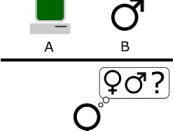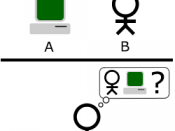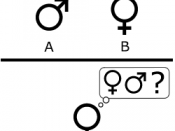In this essay I shall go about to pursue the works of A.M. Turing, Daniel C. Dennet, and others to show the reader that the claim made by Turing--that the Turing Test is an indication of true thinking--is undoubtedly a strong fact and holds true to machine intelligence. For the purpose of this essay, true thinking is defined as 'thinking' one would normally recognize in any human, including him or herself; the capability to 'think' which is specific to humans only. I shall first go into detail about the arguments and claims made by Alan Turing, and outline alternative measures to support his claims by various philosophers. I shall then consider counter arguments to his proposition, and from there show that these counter arguments do not weaken the strength of the Turing Test.
Turing's claim lies at the heart of a profound question, "Can machines think?" He debunks this mystery by analyzing a new form of the problem, in terms of a game entitled, "the imitation game".
An updated version of the game is played with three entities: a human of either gender, a computer, and a random person by the name of "judge". Now, picture three distinct rooms, each connected with the ability to teletype to the one another. In one room sits the human, in another is the computer, and in the last room is the judge. It is the judge's job to figure out which one of them is a human, and which is the machine. From this simple little game, Turing claimed that if the judge was to pick either human or machine (accuracy of 50 per cent or less), then the computer was a reasonable representation of human intelligence (Turing, 29). This process of playing the imitation game is to be known as the...


